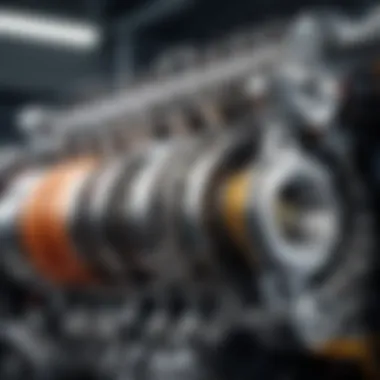Understanding Detonation During Initial Acceleration


Intro
Detonation during the initial acceleration of an automobile is a significant issue that can affect performance, longevity, and overall vehicle health. Understanding the mechanics behind this phenomenon is crucial for automotive enthusiasts and professionals alike. The complexities of both mechanical and chemical interactions during acceleration create a scenario where detonation can occur, often leading to adverse effects on the engine and vehicle systems.
In this article, we will explore the various facets of detonation, from its causes to the solutions that can mitigate its impact. Automotive enthusiasts, mechanics, and industry experts will benefit from gaining deeper insights into diagnosing and managing detonation, which ultimately enhances vehicle performance and reliability.
Обзор автомобиля
When discussing detonation, it is essential to first understand the fundamentals of the automobile's architecture. Modern vehicles are intricate systems comprising numerous components working in tandem. Knowing the primary characteristics of these vehicles aids in comprehending how detonation occurs.
Основные характеристики
An automobile generally consists of the following major systems:
- Engine: The heart of the vehicle, converting fuel into motion.
- Transmission: Transmits power from the engine to the wheels, affecting acceleration.
- Fuel System: Delivers fuel to the engine, crucial for achieving the right air-fuel mixture.
These systems work together to ensure that the vehicle accelerates smoothly. However, if any subsystem is not performing optimally, detonation can occur.
Описание двигателей и трансмиссий
The two primary engine types are gasoline and diesel engines. Gasoline engines typically rely on spark ignition, while diesel engines use compression ignition. Understanding the differences is vital. Gasoline engines are more prone to detonation due to the nature of the fuel-air mixture.
Transmission systems also play a role in initial acceleration. Automatic transmissions offer smoother shifts, while manual transmissions allow for more control. Regardless of the type, the change in RPM during acceleration can influence detonation risk, requiring keen attention from drivers.
Выбор автозапчастей
Maintaining optimal engine performance often involves replacing or upgrading various parts. This leads to the need for understanding how to select quality auto parts to prevent issues like detonation.
Разновидности запчастей
Different types of auto parts are available, including:
- Engine Components: Pistons, heads, and camshafts.
- Fuel System Parts: Injectors and filters.
- Ignition Parts: Spark plugs and coils.
Each component affects how the engine performs and can impact the likelihood of detonation.
Как выбрать качественные запчасти
Selecting quality parts involves:
- Researching reputable brands.
- Reading reviews from other users.
- Consulting with automotive professionals.
By investing in quality parts, car owners can improve performance and reduce the risk of detonation during acceleration.
Effective selection of automotive parts plays a critical role in maintaining engine health and preventing detonation.
Definition of Detonation
Understanding detonation is crucial to grasping engine performance, specifically during the initial acceleration phase of vehicles. Detonation, often referred to as "knocking," occurs when the fuel-air mixture in the combustion chamber ignites prematurely. This early ignition can cause harmful pressure waves to form, potentially damaging engine components.
Several aspects highlight the significance of detonation in this context. Firstly, it affects power delivery. When detonation happens, the engine can experience a temporary loss of power, which might affect overall vehicle acceleration. Secondly, the longevity of an engine can be compromised. Continuous detonation can contribute to severe wear on surfaces and lead to costly repairs.
Moreover, it is important to recognize the variations in detonation based on different fuel types and engine designs. For example, a high-performance engine might manage detonation differently compared to a standard engine. Understanding these elements is essential for mechanics and automotive professionals working towards enhancing vehicle performance and ensuring reliability.
Explaining Detonation
Detonation is defined as the rapid combustion of the fuel-air mixture in an engine. It occurs after the spark plug ignites the fuel but before the flame travels smoothly through the combustion chamber. The ignition process should ideally be controlled and occur uniformly. However, in certain conditions, the mixture can ignite in localized areas before it is supposed to.
Several factors contribute to this phenomenon. High compression ratios and low-quality fuels can significantly influence detonation risks. Furthermore, improper ignition timing may exacerbate the problem.
Here are some typical signs indicating detonation:
- Unusual engine noises: Drivers may hear a pinging or knocking sound.
- Performance degradation: The vehicle might not accelerate smoothly or efficiently.
- Engine overheating: Increased temperatures can indicate inefficiencies linked to detonation.
Recognizing the mechanics behind detonation is fundamental for troubleshooting and implementing corrective actions to improve engine health. Acknowledging this issue early can prevent further damage and save costs in repairs.
Mechanics of Initial Acceleration
The mechanics of initial acceleration play a crucial role in understanding the detonation phenomenon in automobiles. Acceleration is not just about how quickly a vehicle can move; it encompasses the intricate interplay between various engine components, the fuel used, and the conditions under which the vehicle operates. By delving into these mechanics, one can identify how detonation can occur and what implications it has on performance.
The Role of Engine Dynamics
Engine dynamics refer to the behavior and performance of an engine during various operational phases. Initial acceleration is a critical moment when torque and power are rapidly demanded from the engine.
During this stage, the engine must respond efficiently to driving demands, ensuring that the air-fuel mixture ignites at the right moment. If the engine dynamics are not optimized, it leads to uneven combustion. Reasons include:
- Inadequate fuel delivery: If the fuel system cannot provide the right amount of fuel when needed, detonation might occur.
- Poor airflow: Insufficient airflow can also affect how well the mixture combusts, again leading to a possible detonation.
The engine's compression ratio and the timing of ignition sparks must be aligned perfectly. An imbalance can quickly result in premature combustion, the very essence of detonation, which damages engine components over time. Thus, understanding engine dynamics is key to mitigating potential risks.
Fuel-Air Mixture Behavior
Fuel-air mixture behavior is fundamental in detonation dynamics. The mixture must be precisely calibrated for optimal combustion under acceleration conditions. Any variations can lead to unstable ignition, contributing to detonation problems.
When accelerating:
- Rich mixtures: Too much fuel can lead to incomplete combustion. As a result, fuel ignites in uncontrolled ways, causing detonation.
- Lean mixtures: Conversely, a too-rich air-fuel ratio can cause excessive temperatures, also leading to detonation.


Moreover, proper atomization of fuel is essential. Fuel must be finely dispersed in the air to ensure that it burns efficiently. If the mixture is not well-atomized, larger droplets of fuel can cause delayed combustion. This aspect amplifies detonation risk as it creates sudden pressure spikes in the combustion chamber.
In summary, the mechanics of initial acceleration are complex but necessary to comprehend. Both engine dynamics and fuel-air mixture behavior directly affect the potential for detonation, shaping not just performance but also longevity of automotive engines.
Causes of Detonation During Acceleration
Understanding the causes of detonation during the acceleration phase of an automobile is essential for diagnosing and preventing engine performance issues. Detonation can lead to significant complications in engine operation, reducing efficiency and longevity. By analyzing the underlying factors contributing to this phenomenon, automotive enthusiasts and professionals can implement informed strategies to mitigate risks.
High Compression Ratios
One of the primary causes of detonation is high compression ratios. In simple terms, compression ratio is the ratio of the volume of an engine's cylinder when the piston is at the bottom of its stroke to the volume when it is at the top. When the compression ratio is too high for the fuel being used, the gasoline may ignite prematurely due to the intense heat and pressure inside the cylinder.
Exceeding the recommended compression ratio can lead to knock, which is a rapid and uncontrolled release of energy. Here are some considerations regarding high compression ratios:
- Fuel Type Compatibility: Not all fuels can handle high compression. For example, using regular unleaded gasoline in a high-compression engine designed for premium fuel can cause detonation.
- Engine Design: Engines are designed with specific compression ratios in mind. Modifying an engine to increase compression without proper tuning can increase the risk of detonation.
Fuel Quality
Fuel quality plays a critical role in detonation. High-quality fuels contain additives that can enhance performance and decrease the likelihood of knock. Fuels with higher octane ratings have better resistance to detonation. Using lower octane fuels in high-performance engines may not provide sufficient resistance to pre-ignition, leading to detonation problems.
Moreover, contaminants in fuel can also contribute to detonation. Dirt or water can alter the combustion parameters, causing issues during acceleration. Owners should ensure they use reputable fuel sources and consider the following:
- Regular Maintenance: Maintaining fuel systems can prevent issues associated with contamination.
- Choosing the Right Fuel: Selecting fuel that matches the vehicle's requirements can help reduce the risk of knock.
Ignition Timing
Ignition timing is another significant factor in detonation. It refers to the moment the spark plug fires, igniting the air-fuel mixture. If the timing is advanced too much, it can cause the mixture to ignite before the piston reaches top dead center, resulting in detonation.
Correct ignition timing can be achieved through tuning. An improper timing setting can lead to:
- Engine Misfires: Premature ignition can cause misfires and loss of power.
- Performance Issues: Too much advance leads to decreased performance and increased wear on engine components.
Balancing ignition timing is essential for optimal engine performance. Automotive professionals should regularly verify timing to ensure it aligns with manufacturer specifications.
Understanding these causes allows for better management of detonation during initial acceleration which is vital for maintaining engine health.
Symptoms of Detonation Issues
Understanding the symptoms of detonation during initial acceleration is crucial for maintaining engine health. When detonation occurs, it can create a series of adverse effects that compromise performance and longevity. Recognizing these symptoms not only helps in early diagnosis but also aids in preventing more severe engine damage.
Identifying these issues often requires a keen sense of observation and some experience with engine behavior. Awareness of common signs can lead to proactive measures, ensuring that the vehicle operated efficiently. Below are key symptoms to be aware of.
Audible Sounds
One of the first indicators of detonation is noticeable audible sounds emanating from the engine. This may include a sharp ping or knock noise, which tends to occur under load or during acceleration. While not all sounds indicate a problem, consistent and unusual noises are worth investigating. The presence of such sounds suggests that the air-fuel mixture is igniting prematurely, causing knocking that can harm the engine over time.
Diagnosing audible sounds might require not just listening but also inspecting the engine under varying conditions. Data from modern sensors can complement this observation. It is critical to assess when these sounds occur. If they coincide with acceleration, adjustments may be needed to ignite timing or engine load to mitigate the issue.
Performance Drops
A noticeable drop in engine performance often accompanies detonation. Drivers may feel a lack of power when accelerating, which can hinder overall driving experience. This performance decline can manifest as sluggishness or insufficient response when pressing the accelerator. In certain situations, the vehicle may struggle to reach higher speeds, particularly during initial acceleration when detonation issues are more likely to occur.
It is beneficial to understand what a drop in performance might imply. Early warnings can signal a need for inspection of the ignition system, fuel quality, or air-fuel mixture parameters. By recognizing this condition promptly, it provides a chance to address underlying problems before they cause extensive damage.
Engine Temperature Fluctuations
Another critical symptom of detonation relates to engine temperature. An engine that experiences fuel mixture issues may exhibit increased temperature levels, which can create imbalances in engine performance. Sharp spikes in temperature can lead to various complications, including damage to engine components.
Engine monitoring tools can provide insights into temperature variations. Sudden changes while driving under similar conditions are alarming. If temperatures continually rise above recommended thresholds, it suggests the presence of a detonation problem that needs immediate attention.
Understanding these symptoms early can save time, resources, and anxiety during repairs. Identifying issues related to detonation and taking corrective action is essential in achieving a reliable and efficient vehicle.
Recognizing the signs of detonation is an essential skill for any automotive enthusiast or mechanic. Taking these symptoms as serious warnings can lead to longer engine life and improved performance. Keeping a close watch on audible sounds, performance metrics, and temperature variations will better equip drivers to respond effectively to potential problems.
Effects of Detonation on Engine Performance
Understanding the effects of detonation on engine performance is crucial for any automotive enthusiast or professional. Detonation can severely impact not only the immediate power output of a vehicle but also its overall longevity and health. When detonation occurs, it creates abnormal combustion patterns that lead to various adverse consequences for the engine and its components.
Power Loss
One of the most significant impacts of detonation is power loss. During detonation, the combustion process becomes erratic. This irregular combustion leads to a decrease in engine efficiency, which in turn lowers the power output. When the air-fuel mixture ignites prematurely, it can create a loss of the energy that should contribute to the engine’s performance.
Additionally, the downward pressure that should propel the piston downwards can be countered by the sudden increase in pressure caused by detonation. This effectively retards the engine's ability to produce the power that is expected under normal operating conditions.
Modern vehicles are designed with mechanisms to mitigate power loss due to detonation. However, persistent issues can result in a noticeable decline in acceleration and responsiveness. Thus, understanding the intricacies of how detonation affects power is vital for diagnosing performance degradation.
Increased Wear and Tear
Moreover, detonation can lead to increased wear and tear on engine components. The intense pressure and temperature fluctuations associated with detonation put excessive stress on pistons, cylinder heads, and other internal engine parts. This can result in premature fatigue of components, leading to expensive repairs or replacements.
In particular, the following elements are influenced:
- Piston Damage: The abnormal combustion can cause piston surfaces to melt or erode over time.
- Cylinder Head Cracks: High stress and heat can lead to cracks, affecting overall engine integrity.
- Valvetrain Issues: The erratic pressures can affect valve operation, causing earlier than expected failures.
Ultimately, this increased wear reduces the engine's lifespan significantly. Understanding the effects of detonation not only aids in preventing power loss but also helps maintain overall vehicle health.
Power loss and increased wear due to detonation can ultimately lead to high repair costs and reduce the vehicle's reliability over time.
Preventive measures and timely diagnostics are essential to combatting these issues. Alongside proper vehicle maintenance, awareness of detonation's impacts can empower car owners and mechanics alike to make informed decisions about their engines.


Long-Term Implications of Detonation
Detonation can have several long-term implications for automotive engines, particularly those subject to frequent acceleration. Understanding these implications is crucial for both vehicle owners and mechanics. Addressing detonation issues early can lead to better engine longevity and reduced costs in maintenance and repairs.
Engine Damage Potential
The first aspect worth noting is the potential for engine damage. When detonation occurs, it creates an abnormal combustion process. This can lead to increased pressure and temperature inside the combustion chamber. Over time, this excessive strain can result in significant damage to engine components.
Common points of damage include:
- Piston Crown: The top of the piston can become eroded or cracked due to repeated high-pressure impacts from detonating fuel.
- Cylinder Head: The cylinder head may warp or crack, compromising the seal and leading to further issues.
- Connecting Rods: Increased forces from detonation can cause connecting rods to bend or fracture, which can lead to catastrophic engine failure.
Additionally, if detonation is not resolved, it may also affect the engine's overall performance. The engine might lose its efficiency, requiring more fuel to maintain the same power output. This not only impacts performance but also contributes to higher operational costs.
Cost Implications
The cost implications associated with chronic detonation issues are significant. The initial costs of repairs can be high due to the need for legitimate engine overhauls. Moreover, unexpected repairs could lead to extended downtime and lost income for those who rely on their vehicles for transportation or business.
Some costs to consider include:
- Parts Replacement: As discussed, components like pistons and rods may need replacement after experiencing damage from detonation.
- Mechanical Labor: Repairing or replacing engine parts requires skilled mechanics, which can be expensive.
- Fuel Costs: An engine that runs inefficiently due to detonation may consume more fuel, leading to long-term financial impacts.
Addressing detonation early can help prevent costly repairs and maintain vehicle performance.
- Increased Operational Costs: There may also be a general increase in the overall operational costs of the vehicle due to decreased fuel economy and potential repairs.
Diagnosis of Detonation Problems
Effective diagnosis of detonation issues is crucial to maintaining engine performance and longevity. Understanding how to diagnose detonation can greatly enhance the reliability of an automobile. Many drivers do not realize the subtle signs of detonation, which can lead to significant engine damage if left unchecked. By recognizing early symptoms, one can take action before severe consequences arise.
Accurately diagnosing detonation requires a combination of practical tools and understanding of the engine's behavior. Not only does this help in ensuring optimal engine performance, but it can also lead to cost savings in repairs and maintenance. By being proactive, vehicle owners can avoid more extensive issues that may require far-reaching repairs.
Tools Required for Diagnosis
To diagnose detonation effectively, several tools and technologies should be employed. The right tools not only measure symptoms but also clarify the underlying causes of detonation. Important tools include:
- Knock Sensors: These devices detect knocking sounds in the engine and relay information to the engine control unit.
- OBD-II Scanners: Onboard diagnostics scanners provide valuable data related to engine performance, including any fault codes that may indicate detonation issues.
- Compression Tester: This tool helps measure the compression ratios in the engine cylinders, which can indicate if excessive pressure promotes detonation.
- Fuel Quality Analyzer: It checks the octane rating of fuel being used, crucial for avoiding knock due to poor fuel quality.
In addition to these tools, keeping a detailed log of engine performance over time can provide insights into trends that might indicate a developing detonation problem.
Indications from Engine Control Units
Engine control units (ECUs) play a significant role in diagnosing detonation issues. These sophisticated computers continuously monitor various parameters to optimize engine performance. Key indicators from ECUs include:
- Knock Retard Messages: When the ECU detects knocking, it may make adjustments to ignition timing to prevent damage. Anomalies in timing adjustments can signal potential detonation issues.
- Fuel Trim Adjustments: Significant variations in fuel trim values might suggest that the fuel-air mixture is not optimal, which can contribute to detonation.
- Misfire Codes: Persistent misfire codes may correlate with a detonation issue, as improper combustion can cause increased pressure and temperature leading to knocking.
By paying close attention to these indicators from the ECU, car owners and technicians can quickly identify and address problems related to detonation before they escalate into serious engine damage.
Detecting detonation early is key to maintaining engine health and preventing costly repairs.
Mitigating Detonation Risks
Mitigating detonation risks is crucial for ensuring optimal engine performance and longevity. Detonation, if left unaddressed, can lead to significant engine damage and decreased efficiency. Understanding the methods to minimize these risks enables vehicle owners and mechanics to maintain engine health and improve performance. Effective mitigation strategies involve careful adjustments to engine parameters, particularly concerning ignition timing and fuel quality. Moreover, implementing correct engine tuning techniques can enhance the overall functionality of the vehicle. Each of these elements plays a vital role in achieving a balance between performance and reliability.
Adjusting Ignition Timing
Adjusting ignition timing is one of the primary strategies to reduce the risks of detonation. When ignition timing is set too early, it can lead to a premature combustion process. This results in increased pressure and temperature within the combustion chamber, thus triggering detonation. Properly retarding the ignition timing allows for a smoother and safer burn of the fuel-air mixture. It is essential to consider the specific requirements of the vehicle's engine as each model may have unique parameters. Finding the optimal timing point may involve some trial and error, but it is critical for ensuring engine safety.
Optimizing Fuel Quality
Fuel quality is another significant factor in mitigating detonation risks. Using low-octane fuel may not provide the necessary resistance against knocking, especially in high-performance engines. Alternative fuels with higher octane ratings, such as premium gasoline, can reduce the likelihood of detonation by providing better performance under pressure. Additionally, ensuring that the fuel is clean and free from impurities is vital. Contaminated fuel can lead to inconsistencies in combustion, further exacerbating detonation issues. Regularly checking and maintaining fuel systems contributes to overall engine efficiency.
Implementing Engine Tuning Techniques
Implementing engine tuning techniques is essential for enhancing engine performance while minimizing detonation risks. This may involve recalibrating the engine control unit (ECU) to optimize performance parameters such as air-fuel ratios and timing maps. Tuning requires a thorough understanding of the vehicle’s dynamics, and adjustments must be made based on specific driving conditions. It is advisable to utilize professional tuning services, as they can apply advanced methods like dyno testing to ensure peak performance. Effective tuning can lead to improved throttle response and acceleration without risking detonation, making it an indispensable technique for modern vehicles.
"Regular maintenance and informed adjustments are essential in mitigating detonation risks and ensuring a well-functioning engine."
Maintaining optimal engine conditions through these methods can significantly enhance the overall vehicle performance and longevity. By prioritizing ignition timing, fuel quality, and engine tuning, automotive enthusiasts and professionals can effectively manage and reduce the risks associated with detonation.
Advancements in Engine Technology
The evolution of engine technology has been pivotal in addressing the detonation phenomenon during initial acceleration. These advancements not only enhance engine performance but also mitigate potential risks associated with detonation. Understanding these technological improvements is crucial for automotive enthusiasts and professionals alike, as they can significantly impact both vehicle efficiency and longevity.
Role of Modern Engine Management Systems
Modern engine management systems (EMS) play a critical role in preventing detonation. These sophisticated systems optimize various engine parameters in real-time, including fuel injection timing, air-fuel ratios, and ignition timing. By using sensors to monitor engine conditions, EMS can make necessary adjustments to reduce the likelihood of detonation.
For example, advanced EMS can detect when a vehicle is experiencing conditions conducive to detonation, such as high temperatures or improper fuel-air mixtures. In response, the system can alter ignition timing to create a more favorable combustion environment, thus protecting the engine from potential damage.
Some key features of these modern systems include:
- Real-time adjustments: Immediate modifications to engine behavior based on sensor feedback.
- Improved fuel efficiency: Better control over fuel mixtures resulting in lower consumption and emissions.
- Enhanced performance: Optimized power output while minimizing the risk of detonation.
By continually refining these technologies, manufacturers are better equipped to combat the challenges posed by detonation during initial acceleration.
Research on Fuel Additives
Research into fuel additives has gained traction in recent years, specifically for their potential to reduce detonation. These additives can modify the characteristics of fuels, improving conductivity and oxidation stability which lead to smoother combustion processes. As a result, the engine operates in a more controlled manner, lessening the chances for detonation.


There are two primary types of fuel additives:
- Octane boosters: These increase the octane rating of fuel, allowing it to withstand higher compression before detonation occurs. This is particularly relevant in high-performance vehicles that require specific fuel qualities to optimize their output.
- Detergents: They clean the fuel system, maintaining optimal combustion conditions by preventing the buildup of deposits that can alter fuel dynamics.
The benefits of incorporating advanced fuel additives include:
- Reduction in knocking: Less engine noise and vibration during operation.
- Improved engine longevity: Less stress on engine components due to smoother combustion.
- Higher performance: Engines can achieve their full potential without the risks associated with detonation.
These advancements in fuel technology form an essential component in understanding and managing detonation during initial acceleration. Emphasizing technological innovation is vital for a future with safer, more efficient vehicles.
Impact of Driving Behavior on Detonation
Driving behavior plays a pivotal role in the occurrence of detonation during the initial acceleration phase of an automobile. Understanding how specific driving techniques and conditions affect engine performance can provide valuable insights for car enthusiasts and professionals alike. By modifying driving habits, one can significantly mitigate the risk of detonation while improving overall vehicle efficiency and reliability.
Acceleration Techniques
The way a driver accelerates has direct implications for detonation events. For instance, rapid and aggressive acceleration can generate excessive pressure within the combustion chamber. This increase in pressure can lead to premature ignition of the fuel-air mixture, resulting in detonation. Conversely, smooth and controlled acceleration allows for better fuel atomization and a more uniform burn.
Here are some effective acceleration techniques:
- Gradual Application of Throttle: Apply the accelerator gradually rather than abruptly. This will maintain optimal engine parameters.
- Maintaining Engine RPM: Keeping the engine RPM within a safe range reduces the risk of knocking. Each engine has its own sweet spot for RPMs; understanding this can be beneficial.
- Avoiding Overloading: Driving with a heavily laden vehicle or towing more than recommended can stress the engine. This stress often leads to conditions favorable for detonation.
Improving these techniques can not only reduce detonation risks but also enhance fuel economy and performance.
Load Conditions
The load conditions under which a vehicle operates significantly influence detonation tendencies. Load refers to the weight and demands placed on the engine during operation. Heavy loads can result in higher cylinder pressures in the engine, making detonation more likely. Factors influencing load conditions include gradient of the road, towing capacity, and passenger weight.
Here are several considerations regarding load conditions:
- Gradient: Ascending steep hills increases engine load. Drivers should be aware of how steep inclines affect their vehicle's acceleration.
- Towing Weight: Always adhere to the manufacturer’s towing recommendations. Exceeding these guidelines can lead to more than just detonation; it can ultimately damage the engine.
- Passenger Weight: A full vehicle can change the dynamic of acceleration. Being conscious of passenger and cargo weight can help in planning routes and accelerations better.
"Proper management of load conditions can be as critical as fuel quality in preventing detonation issues."
In summary, a nuanced understanding of driving behaviors—specifically acceleration techniques and load conditions—can serve as an effective preventative measure against detonation. As an educated driver, engaging with these concepts will aid in prolonging engine life and maximizing performance.
Regulatory Aspects Related to Fuel Standards
Fuel standards dictate the composition of fuels available at gas stations. This directly influences combustion efficiency and the likelihood of detonation. Regulated fuel quality helps avoid mixtures that could lead to pre-ignition or uncontrolled combustion, which are precursors to detonation.
Furthermore, compliance with emission regulations requires the automotive industry to consider the formulation of their fuels. For instance, the introduction of cleaner-burning fuels reduces the potential for deposits that may contribute to knocking. Manufacturers are then compelled to innovate. Thus, regulatory aspects foster improvements in fuel technology, ultimately enhancing engine performance.
"The proper fuel standard not only protects the environment but also ensures smoother vehicle operation."
The implications of fuel standards go beyond compliance; they also impact consumer choices. By promoting higher-quality fuels, manufacturers support detonation management. Consumers are better informed about the products they use and their long-term effects on vehicle health. Therefore, understanding these regulatory aspects is vital for anyone involved in the automotive industry, from engineers to consumers.
Fuel Emission Standards
Fuel emission standards set allowable limits for pollutants released during fuel combustion. Stricter regulations lead to the use of cleaner fuels. These advanced formulations are designed to produce fewer emissions, but they can also enhance overall engine performance.
For example, fuels with low sulfur content reduce the risk of corrosion and deposit buildup within the engine, effectively lowering the risk for detonation. The focus on emissions also necessitates improvements in the efficiency of fuel-air mixing, which is vital for optimal combustion.
Industry Impact on Detonation Issues
The automotive industry faces significant impacts due to regulatory pressures. As manufacturers strive to meet evolving fuel standards, they invest in research and development. This aims not only to comply with regulations but also to mitigate detonation risks. Industry innovations such as advanced fuel ignition systems and engine tuning software are direct responses to the challenges posed by existing regulations.
Additionally, there is a cascading effect. As fuel quality improves, vehicle manufacturers design engines that capitalize on these advancements, reducing the likelihood of detonation. Overall, the industry's adaptability to these regulatory standards can significantly influence vehicle longevity and efficiency.
Future Trends in Automotive Engineering
Future trends in automotive engineering are crucial for understanding the evolution of vehicle technologies and their impact on performance metrics such as detonation during initial acceleration. As regulations and consumer preferences shift towards more sustainable practices, it is vital to examine how these developments influence engine dynamics and fuel efficiency.
One significant trend is the emphasis on electric vehicles. The shift from traditional internal combustion engines to electric powertrains marks a transformative phase in the automotive industry. This transition is not merely about the replacement of fuel with electricity; it fundamentally alters how energy is converted and managed within vehicles. Electric vehicles, such as those produced by Tesla, present a much lower risk of detonation issues since they rely on electric motors instead of combustion processes. As we enhance our understanding of detonation phenomena, it's essential to recognize the potential of electric vehicles in mitigating such concerns while offering superior performance and energy efficiency.
Another vital component of future trends is the examination of emerging fuel technologies. The automotive industry is increasingly focused on alternative fuels that can provide better combustion characteristics, thereby reducing the likelihood of detonation. These fuels include biofuels, hydrogen, and synthetic fuels. Research and development in this area indicate a potential for fuels that improve the quality of combustion, enhance engine performance, and decrease harmful emissions.
"The automotive industry is at a crossroads, balancing performance with sustainability. Emerging fuel technologies will play a critical role in shaping the next generation of vehicles."
As these trends unfold, several factors must be considered:
- R&D investment: Enhancement in fuel types requires significant research and technology investments.
- Consumer education: Educating consumers on these new technologies will be essential for widespread adoption.
- Regulatory compliance: As governments set stricter emission standards, automakers must adapt quickly.
Closure
The Conclusion section is vital in summarizing the key takeaways from the discussion on detonation during initial acceleration. This article has provided a thorough examination of various aspects surrounding detonation, including its causes, symptoms, implications, and potential solutions. Understanding these elements is essential for automotive enthusiasts and professionals who aim to enhance engine performance and longevity.
In this article, we emphasized the impact of high compression ratios, fuel quality, and ignition timing on detonation occurrence. Recognizing these factors equips readers with knowledge to mitigate risks effectively. The importance of diagnosis using modern tools and engine control units was highlighted, as early detection can prevent severe damage and costly repairs.
Moreover, we addressed the role of driving behavior and regulatory aspects related to fuel standards. These considerations are significant since they contribute to the overall management of detonation issues. Advances in engine technology were also explored, showcasing how modern systems can address the challenges related to detonation.
Understanding the information shared in this article provides profound benefits. It leads to a more informed decision-making process regarding engine management. Moreover, it encourages best practices in automotive maintenance and engineering. Overall, insights gained can drastically improve performance, efficiency, and engine lifespan.
Summary of Key Points
In reviewing detonation during initial acceleration, several key points emerge:
- Detonation is characterized by uncontrolled combustion that can damage an engine.
- High compression ratios, poor fuel quality, and incorrect ignition timing are primary causes.
- Symptoms can include unusual sounds, power loss, and spikes in engine temperature.
- Long-term implications of detonation include potential engine damage and increased repair costs.
- Effective diagnosis requires proper tools and understanding of engine control systems.
- Mitigating risks involves adjusting ignition timing, optimizing fuel quality, and implementing tuning techniques.
These points serve as a framework for anyone looking to deepen their understanding of detonation management.
Final Thoughts on Detonation Management
Managing detonation is crucial for vehicle health. With the right knowledge and tools, enthusiasts and professionals can navigate the challenges posed by this phenomenon.
Maintaining optimal engine performance necessitates a proactive approach. This includes regular monitoring of fuel quality, adjusting driving techniques, and staying informed about advancements in engine technology. Awareness of the implications of detonation can lead to better decision-making within automotive circles, whether for daily drivers or high-performance vehicles.







